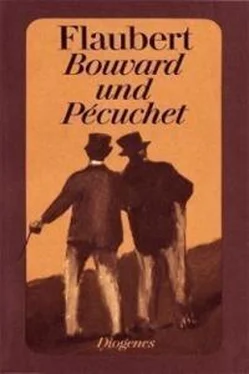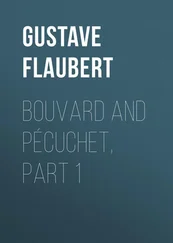The four limbs were dried up. The grinning jaws disclosed teeth of ivory under the bluish lips; in place of the stomach there was a mass of earth–coloured flesh which seemed to be palpitating with the vermin that swarmed all over it. It writhed, with the sun's rays falling on it, under the gnawing of so many mouths, in this intolerable stench—a stench which was fierce and, as it were, devouring.
Yet wrinkles gathered on Bouvard's forehead, and his eyes filled with tears.
Pécuchet said in a stoical fashion, "One day we shall be like that."
The idea of death had taken hold of them. They talked about it on their way back.
After all, it has no existence. We pass away into the dew, into the breeze, into the stars. We become part of the sap of trees, the brilliance of precious stones, the plumage of birds. We give back to Nature what she lent to each of us, and the nothingness before us is not a bit more frightful than the nothingness behind us.
They tried to picture it to themselves under the form of an intense night, a bottomless pit, a continual swoon. Anything would be better than such an existence—monotonous, absurd, and hopeless.
They enumerated their unsatisfied wants. Bouvard had always wished for horses, equipages, a big supply of Burgundy, and lovely women ready to accommodate him in a splendid habitation. Pécuchet's ambition was philosophical knowledge. Now, the vastest of problems, that which contains all others, can be solved in one minute. When would it come, then? "As well to make an end of it at once."
"Just as you like," said Bouvard.
And they investigated the question of suicide.
Where is the evil of casting aside a burden which is crushing you? and of doing an act harmful to nobody? If it offended God, should we have this power? It is not cowardice, though people say so, and to scoff at human pride is a fine thing, even at the price of injury to oneself—the thing that men regard most highly.
They deliberated as to the different kinds of death. Poison makes you suffer. In order to cut your throat you require too much courage. In the case of asphyxia, people often fail to effect their object.
Finally, Pécuchet carried up to the garret two ropes belonging to their gymnastic apparatus. Then, having fastened them to the same cross–beam of the roof, he let a slip–knot hang down from the end of each, and drew two chairs underneath to reach the ropes.
This method was the one they selected.
They asked themselves what impression it would cause in the district, what would become of their library, their papers, their collections. The thought of death made them feel tenderly about themselves. However, they did not abandon their project, and by dint of talking about it they grew accustomed to the idea.
On the evening of the 24th of December, between ten and eleven o'clock, they sat thinking in the museum, both differently attired. Bouvard wore a blouse over his knitted waistcoat, and Pécuchet, through economy, had not left off his monk's habit for the past three months.
As they were very hungry (for Marcel, having gone out at daybreak, had not reappeared), Bouvard thought it would be a healthful thing for him to drink a quart bottle of brandy, and for Pécuchet to take some tea.
While he was lifting up the kettle he spilled some water on the floor.
"Awkward!" exclaimed Bouvard.
Then, thinking the infusion too small, he wanted to strengthen it with two additional spoonfuls.
"This will be execrable," said Pécuchet.
"Not at all."
And while each of them was trying to draw the work–box closer to himself, the tray upset and fell down. One of the cups was smashed—the last of their fine porcelain tea–service.
Bouvard turned pale.
"Go on! Confusion! Don't put yourself about!"
"Truly, a great misfortune! I attribute it to my father."
"Your natural father," corrected Pécuchet, with a sneer.
"Ha! you insult me!"
"No; but I am tiring you out! I see it plainly! Confess it!"
And Pécuchet was seized with anger, or rather with madness. So was Bouvard. The pair began shrieking, the one excited by hunger, the other by alcohol. Pécuchet's throat at length emitted no sound save a rattling.
"It is infernal, a life like this. I much prefer death. Adieu!"
He snatched up the candlestick and rushed out, slamming the door behind him.
Bouvard, plunged in darkness, found some difficulty in opening it. He ran after Pécuchet, and followed him up to the garret.
The candle was on the floor, and Pécuchet was standing on one of the chairs, with a rope in his hand. The spirit of imitation got the better of Bouvard.
"Wait for me!"
And he had just got up on the other chair when, suddenly stopping:
"Why, we have not made our wills!"
"Hold on! That's quite true!"
Their breasts swelled with sobs. They leaned against the skylight to take breath.
The air was chilly and a multitude of stars glittered in a sky of inky blackness.
The whiteness of the snow that covered the earth was lost in the haze of the horizon.
They perceived, close to the ground, little lights, which, as they drew near, looked larger, all reaching up to the side of the church.
Curiosity drove them to the spot. It was the midnight mass. These lights came from shepherds' lanterns. Some of them were shaking their cloaks under the porch.
The serpent snorted; the incense smoked. Glasses suspended along the nave represented three crowns of many–coloured flames; and, at the end of the perspective at the two sides of the tabernacle, immense wax tapers were pointed with red flames. Above the heads of the crowd and the broad–brimmed hats of the women, beyond the chanters, the priest could be distinguished in his chasuble of gold. To his sharp voice responded the strong voices of the men who filled up the gallery, and the wooden vault quivered above its stone arches. The walls were decorated with the stations of the Cross. In the midst of the choir, before the altar, a lamb was lying down, with its feet under its belly and its ears erect.
The warm temperature imparted to them both a strange feeling of comfort, and their thoughts, which had been so tempestuous only a short time before, became peaceful, like waves when they are calmed.
They listened to the Gospel and the Credo , and watched the movements of the priest. Meanwhile, the old, the young, the beggar women in rags, the mothers in high caps, the strong young fellows with tufts of fair down on their faces, were all praying, absorbed in the same deep joy, and saw the body of the Infant Christ shining, like a sun, upon the straw of a stable. This faith on the part of others touched Bouvard in spite of his reason, and Pécuchet in spite of the hardness of his heart.
There was a silence; every back was bent, and, at the tinkling of a bell, the little lamb bleated.
The host was displayed by the priest, as high as possible between his two hands. Then burst forth a strain of gladness inviting the whole world to the feet of the King of Angels. Bouvard and Pécuchet involuntarily joined in it, and they felt, as it were, a new dawn rising in their souls.
Roughly speaking, about 93 acres.—TRANSLATOR.
Cuscute —dodder.
One hectare contains 2 acres 1 rood 38 perches.—TRANSLATOR.
The (Text missing in original.— Transcriber. )
Raspail, the author of the work here referred to, was called in to attend Gustave Flaubert's sister Caroline before her death in 1846.—TRANSLATOR.
A decalitre contains over two gallons.—TRANSLATOR.
Читать дальше








![Гюстав Флобер - Закат Карфагена [Сборник]](/books/414440/gyustav-flober-zakat-karfagena-sbornik-thumb.webp)


